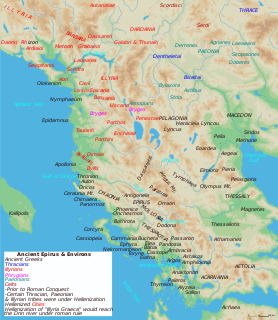 W
WThe Acheron is a river located in the Epirus region of northwest Greece. It is 52 km (32 mi) long, and its drainage area is 705 km2 (272 sq mi). Its source is near the village Zotiko, in the southwestern part of the Ioannina regional unit and it flows into the Ionian Sea in Ammoudia, near Parga.
 W
WAeacidae refers to the Greek descendants of Aeacus, including Peleus, son of Aeacus, and Achilles, grandson of Aeacus—several times in the Iliad Homer refers to Achilles as Αἰακίδης. Neoptolemus was the son of Achilles and the princess Deidamea. The kings of Epirus and Olympias, mother to Alexander the Great, claimed to be members of this lineage.
 W
WIn Greek mythology, Ambracia was an Oeachalian princess and daughter of Melaneus, son of Apollo and Oechalia, and thus, sister of Eurytus. The city of Ambracia in Epirus was named after her.
 W
WAmbrax was a Greek mythological king of the city of Ambracia located in the region in Epirus in ancient Greece. He was king when the exiled Aeneas came to his city. He was son of Dexamenus that was in turn son of Hercules.
 W
WAndromache is an Athenian tragedy by Euripides. It dramatises Andromache's life as a slave, years after the events of the Trojan War, and her conflict with her master's new wife, Hermione. The date of its first performance is unknown. Some scholars place the date sometime between 428 and 425 BC. Müller places it between 420 and 417 BC. A Byzantine scholion to the play suggests that its first production was staged outside Athens, though modern scholarship regards this claim as dubious.
 W
WChaon was a Trojan hero and the eponymous ancestor of the Chaonians who gave his name to Chaonia, a district in northwestern Epirus in Southern Albania near the border with Greece. The stories are unclear as to whether he was the friend or the brother of Helenus, but in either case, he accompanied him to the court of Neoptolemus. The stories concerning Chaon's death are as unclear as that of his relationship to Helenus. Chaon was either killed in a hunting accident or offered himself as a sacrifice to the gods during an epidemic, thus saving the lives of his countrymen. In either case, when Helenus became the ruler of the country, he named a part of the kingdom after Chaon.
 W
WIn Greek mythology, Cragaleus was a son of Dryops who dwelt in the land Dryopis next to a spring which was believed to have appeared at a place where Heracles hit the earth with his club. He was renowned as just and wise, and was one day visited by Apollo, Artemis, and Heracles who asked him to act as an arbiter in their argument as to which of the three should become patron of Ambracia, Epirus. Apollo argued that the city should belong to him on account of the fact that Epirus was once conquered by his son Melaneus, and that he assisted the Ambraciotes in the war against the natives of Epirus, and brought law and order to Ambracia. Artemis reminded that it was she who saved the Ambraciotes from the tyrant Phalecus, having sent a lioness to kill him. Finally, Heracles brought up the fact that it was he who destroyed the many non-Greek peoples of Epirus for trying to steal the kine of Geryon from him, and that the Corinthians, who later came to Epirus and founded Ambracia, were his descendants. Cragaleus considered Heracles' argument the most convincing and declared him the winner. Apollo was enraged and turned Cragaleus into stone. Since then, the Ambraciotes sacrificed to Apollo the Saviour, but believed their city to belong to Heracles and the Heracleidae, and honored Cragaleus with sacrifices as well.